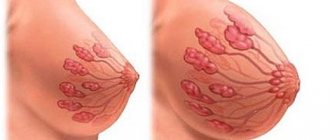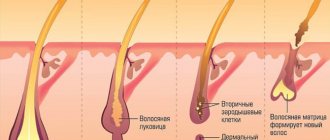During pregnancy, a woman's body inhibits the production of the hormones estrogen and progesterone. The first is responsible for the maturation of the egg, the second is for attaching it to the wall of the uterus. A low level of synthesis of these hormones is also typical for the first 6-8 months after birth, provided that lactation is maintained. The main opponent of conception hormones is prolactin, the production of which is stimulated by the sucking reflex. It provides a woman with protection from re-pregnancy.
But it is impossible to exclude conception during breastfeeding (BF) 100%. Statistics show that the “functionality” of the egg and, therefore, the risk of becoming pregnant during this period remains at 1.5-2%.
Can a nursing woman get pregnant?
If you are breastfeeding [1]:
- The chance of pregnancy is almost zero during the first three months after birth. It is less than 2% between 3 and 6 months and about 6% after 6 months (provided that the mother has not yet returned to her menstrual cycle).
- The average time for the menstrual cycle to return is 14.6 months.
- Women whose cycles return early are usually infertile for the first few cycles. Moms whose cycles return later are more likely to get pregnant quickly.
Source: Natural Child Spacing and Breastfeeding by Jen O'Quinn
Therefore, even when breastfeeding, it is recommended to use contraception and monitor your condition monthly with a hCG level test. In 7% of women, the monthly cycle is established by the 3rd month of feeding, and in 15% of cases, menstruation is delayed until the end of lactation. It is important to note that the egg matures 14-16 days before the first menstruation, and if the mother does not expect menstruation, pregnancy may be detected very late (there have been cases of diagnosis in the third trimester).
If you do not practice breastfeeding (the baby is bottle-fed), you can get pregnant just 3 weeks after the birth of the baby, even if your period has not yet begun [5].
After childbirth (with breastfeeding), you can expect the return of menstruation no earlier than after 6-18 months. This period is individual for each woman. As complementary foods are introduced into the child's diet, the number of breastfeedings decreases. The production of prolactin is suppressed, and estrogen and progesterone “wake up”. From this period, the risk of conception increases, control needs to be strengthened.
How to maximize your natural infertility period?
The timing of return to fertility varies greatly among women. They depend on the baby’s feeding pattern and how sensitive the mother’s body is to the hormones involved in lactation.
- The frequency of breastfeeding and the total amount of time spent breastfeeding per day are the strongest factors influencing the return of fertility. Restoration of fertility is more likely if the frequency and/or duration of breastfeeding the child is sharply reduced.
- Research has shown that nighttime breastfeeding slows the return to fertility.
- One study demonstrated that mothers who were separated from their babies (but expressed breast milk) had a higher risk of pregnancy (5.2%) during the first 6 months [2].
Exclusive breastfeeding (by itself) is 98-99.5% effective in preventing pregnancy, provided the following conditions are met [4]:
- The infant is less than six months old.
- The mother's menstrual cycle has not yet returned.
- The child is breastfed (both day and night) and receives only breast milk (a symbolic amount of other foods is allowed).
How long after giving birth can you get pregnant?
The lactational amenorrhea method is considered quite reliable if certain conditions are met, which will be discussed below. It can be used as a method of birth control for 6 months after birth with a probability of protection of about 98%, which is close to medicinal contraceptives.
In practice, there are cases when the duration of the contraceptive effect changed both in the direction of increase and decrease. Changes in a woman’s body after childbirth are individual and differ in speed and strength of action.
Some mothers fail to achieve the required level of prolactin, which leads to insufficient suppression of ovulation. In such women, the release of an egg is possible within a month after birth.
There are also cases where breastfeeding continued for more than a year, and the contraceptive effect persisted.

. Each woman decides for herself how reliable this method is. For a more complete understanding, it is better to consult a gynecologist who will evaluate the effectiveness of such natural contraception in each specific case and give the necessary recommendations.
The first signs of pregnancy during breastfeeding without menstruation

Obstetricians and gynecologists agree that pregnancy during breastfeeding should be planned no earlier than after 2 years. The female body needs to recover after childbirth and accumulate resources to bear the next fetus. But when a pregnancy is diagnosed, the mother makes the decision to continue it on her own; doctors do not insist on termination. To eliminate the risks of complicated abortions, a nursing mother who is sexually active is advised to carefully monitor signs of conception.
Symptoms
- Toxicosis (60% of cases).
- Increased sensitivity of the mammary glands.
- Dizziness.
- Weakness, drowsiness.
- Aversion to familiar smells and foods.
- Decreased blood pressure.
- Sudden change in appetite (increase or loss).
- Basal temperature 37-37.3 °C.
- Subfebrile body temperature.
- Decreased milk supply (30% of cases).
More often, a nursing mother confuses pregnancy with a cold or banal overwork. This is not surprising, because in the first six months the listed symptoms are considered normal, as the woman gets tired from exertion, frequent feedings, lack of sleep at night, and worrying about the baby. Therefore, it is recommended that a nursing mother with regular sexual life take a pregnancy test once a month.
Support for mom
If, after consulting a doctor, a woman decides to continue breastfeeding during pregnancy, in no case should we forget that now her body especially needs proper, balanced nutrition. It would be useful to support yourself with multivitamin preparations for pregnant women, but you should not rely only on them: firstly, as you know, vitamins are better absorbed from natural food sources, and not from pharmacological preparations, and secondly, the composition of these products cannot be changed at your discretion , and this is fraught with a deficiency or overdose of some components, which can negatively affect the health of the unborn baby. Particular attention in nutrition should be paid to “risk group” vitamins and minerals, which are especially actively consumed during pregnancy and breastfeeding: calcium, magnesium, iron, phosphorus, folic acid. It is worth increasing your protein intake, as it is the main “building material”. And even if a woman stops breastfeeding, you shouldn’t think that she won’t face a deficiency of vitamins and minerals: after all, until recently, her body also worked in emergency mode and without respite, which means it deserves increased attention and care.

Is it possible to breastfeed during pregnancy?

After childbirth, the body is exhausted and only gains resources for recovery. As a rule, it takes 12-18 months to return to stable functioning of the endocrine, genitourinary and cardiovascular systems. With a new pregnancy, the load on the body doubles.
If the first pregnancy and childbirth were accompanied by risks or complications, there is a high probability of these situations repeating. Therefore, it is important to discuss the issue of continuing breastfeeding with the gynecologist leading the pregnancy. A comprehensive examination of the body is recommended to assess the state of resources for simultaneous feeding and gestation.
It is not recommended to continue breastfeeding during a new pregnancy:
- Women over 40 years old.
- After a cesarean section.
- For uterine fibroids.
- With a history of spontaneous abortion.
- If medications are prescribed to preserve the new fetus.
- If ruptures were diagnosed in a previous birth and less than 6 months have passed.
- The gestation period is from 7 months.
If no risk factors are noted, breastfeeding can be continued until the 22nd week in order to provide the first baby with important beneficial elements. Then you should focus on the behavior of the uterus when feeding. If a woman feels “training” contractions, it is better to stop breastfeeding to eliminate the risk of miscarriage.
Breastfeeding during pregnancy: test for mom's health
It is no secret that any pregnancy is a significant shake-up for the mother’s body, because during the pregnancy all organs and systems are subject to various changes and increased stress. If expecting a baby is also combined with breastfeeding, the tension can become threatening. Will a woman’s body be able to cope with it? This must be decided together with the doctor managing the pregnancy. The main criteria for assessing the current situation should be: the age and state of health of the woman before pregnancy, the presence of chronic diseases, the course of previous and current pregnancies (whether there is a threat of its termination, how the woman feels against this background). In this case, one should rely not only on the mother’s well-being, but also on the results of laboratory tests. For example, a complete blood count may signal low hemoglobin levels when iron stores are depleted. If a pregnant woman's hemoglobin level becomes alarmingly low, the risk of developing chronic intrauterine fetal hypoxia (a constant lack of oxygen entering through the placenta, which negatively affects, first of all, the development of the nervous system of the unborn child) will increase.
How to get pregnant while breastfeeding

If a family makes a conscious decision to have similar children, it is recommended to adhere to certain rules. The goal is to “wake up” the hormones estrogen and progesterone.
Recommendations
- It is better to have sex without contraception every 2 days.
- Avoid co-sleeping with your child.
- Feed your baby expressed breast milk from a bottle.
- Accustom your baby to a pacifier.
- Feeding should be carried out not at the request of the child, but according to a schedule.
- Stop night feedings.
If you follow these recommendations, prolactin production will decrease and the likelihood of ovulation and fertilization will increase. But for pregnancy to occur, the egg must still attach and stay on the uterus. This complex process requires stable hormonal levels, which are normally established after 6-8 months (with the introduction of complementary foods).
The probability of conception with breastfeeding within six months after birth is no more than 5%.
Do I need to wean my baby to get pregnant?
Probably no. Breastfeeding can indeed delay the return of fertility, especially if the frequency and duration of breastfeeding remains high. But most women can become fertile again while still feeding their baby with their milk. Additionally, if periods have returned and become regular, it is likely that breastfeeding no longer affects a woman's ability to conceive. [3]
Pregnancy test for breastfeeding
Methods for diagnosing pregnancy during lactation do not differ from traditional ones. It is recommended to use test strips that determine the level of hCG (human chorionic gonadotropin) in the urine. The hormone content increases after the fertilized egg attaches to the uterus. Depending on the declared sensitivity of the test, the period for conducting the study is determined (with a sensitivity of 25 mIU/ml, pregnancy is diagnosed already on the first day of attachment).
The reliability of this method is estimated at 98%. There is no need to doubt the result by referring to lactation. The increase in hCG is not associated with postpartum hormonal changes. Errors are only possible when using an expired test or performing diagnostics before the fertilized egg is implanted.
Does milk disappear during a new pregnancy?
Cessation of lactation during pregnancy during breastfeeding is excluded, since the sucking reflex still provokes the production of prolactin. Breast milk remains nutritious and beneficial for a growing baby.
It is a common belief that pregnancy changes the taste of milk, and the baby refuses breastfeeding on his own. In fact, the taste depends on the composition. In the first month, the product is rich in lactose, which is gradually replaced by sodium. Due to such changes, milk acquires a neutral taste and the sweetness disappears, which many children do not like.
Milk disappears as a result of suppression of prolactin production: without the baby sucking at the breast.
Breastfeeding during pregnancy: what awaits the elder
Mother's milk always remains a unique and valuable, optimally suitable and balanced food product for the child. This value is especially undeniable in the first six months of life, when the baby’s gastrointestinal tract is not yet adapted to properly digest other types of food. The trouble is that, against the background of hormonal changes associated with the mother’s new pregnancy, the milk may acquire an unusual and unpleasant taste for the baby, and then the little one may independently abandon the breast. It is unnecessary to explain that in this case it is impossible to do without transferring him to artificial feeding. But this is only one of the possible options for the development of the situation, and it does not always occur. Of course, the age of the child and his state of health play an important role in deciding whether to feed or not feed. It is especially undesirable to deprive a baby of natural feeding if he was born premature or immature, has received or is receiving antibiotics, is lagging behind in physical and/or psychomotor development, if he has a tendency to allergic diseases or pathologies of the gastrointestinal tract (obvious problems or hereditary predisposition ), symptoms of rickets are noted. It would be good to extend the period of breastfeeding for all healthy babies to at least six months.

Basic methods of abortion during hepatitis B
In the first 8 weeks after childbirth, sexual relations are not recommended, as vaginal fissures that occur during childbirth are vulnerable to bacterial infections. It is better to resume sexual activity after healing of microtraumas with the mandatory use of contraception.
If conception does occur and the parents decide to terminate the pregnancy, it is important to assess the impact of abortion on the mother’s health. The sooner a woman consults a doctor, the more options for termination there will be:
- medicinal (oral capsules - Mifepristone, Misoprostol, Gimeprost);
- surgical;
- vacuum.
Medical termination of pregnancy
Suitable for periods up to 6 weeks. The less time has passed since conception, the safer the procedure is for the mother’s health. The drugs contain a substance that blocks the effect of progesterone on the endometrium. As a result of a lack of “support”, the fertilized egg separates and is rejected by the body.
The active ingredients penetrate into milk in small quantities that are safe for the baby. But after a medical abortion, breastfeeding is suspended for 48-72 hours. During the period of abstinence, milk is expressed.
The type, dosage and time of suspension of breastfeeding are determined by the treating gynecologist. Medicines are dispensed only as prescribed by a doctor.
Surgical method
It continues to be in demand due to low restrictions on the timing of the operation - up to 12 weeks without indications, up to 22 weeks strictly based on indications. The method involves scraping the fetal body from the uterine cavity. The longer the period, the more difficult the operation. If general anesthesia is used, breastfeeding is suspended for 72 hours. In case of local anesthesia, breastfeeding may not be interrupted.
"Golden mean"
During breastfeeding, the mother's pituitary gland releases oxytocin. As is known, this hormone causes contractions of the uterine muscles during childbirth. However, at least until mid-pregnancy (up to the 20th week), the nerve cells of the myometrium (the muscular layer of the uterus) are insensitive to oxytocin. Therefore, with a normal pregnancy and a healthy uterus, the real threat of premature birth during breastfeeding exists only in the third trimester (after 28-30 weeks). Until this time, oxytocin does not cause contractions in the uterus of sufficient force. However, the “gold standard” in obstetrics is considered to be cessation of breastfeeding in the second trimester - no later than 20 weeks. By this point, the amount of milk produced is usually significantly reduced. However, if there are complications of pregnancy (threat of termination of the present and spontaneous abortions in previous pregnancies, a sharp decrease in the level of hemoglobin in the blood, severe toxicosis, uterine fibroids, etc.), this may serve as a reason to stop feeding much earlier - in the first trimester, before the end of 12 weeks. Often the reason for stopping breastfeeding is increased sensitivity of the nipples, which develops during a new pregnancy. For some, this may happen closer to the middle of pregnancy (at 18-20 weeks), for others - much earlier, even in the first weeks.
Don't allow competition!
Along with the “pragmatic” points discussed above, one should not ignore the psychological side, in particular, the state and feelings of the older child. The appearance of a second child in a family is always, to one degree or another, associated with competition and jealousy. When children are still very young, the issue of breastfeeding can become a serious bone of contention: who will ultimately get the coveted milk from mother’s breast? To avoid such dramas, it is necessary to stop breastfeeding the older child at least several months before the arrival of the younger one, so that in the minds of the first toddler the birth of a brother or sister is not associated with weaning. Otherwise it will only aggravate the situation. Fortunately, the younger the child, the less time it takes for him to “forget” about his mother’s breast. This means that, in the absence of contraindications, you can feed him a little longer, especially since for a small child mother’s milk has an incomparably higher biological value. Children after one and a half years of age may regret breastfeeding for six months or more and try to resume this method of feeding. The appearance of a “competitor” can be very difficult for such kids. But if it so happens that the previous period of breastfeeding was prolonged, and a new pregnancy occurred against its background, the mother should try to stop feeding the grown-up baby as soon as possible so that he has time to get used to the new state of affairs and endure the birth of a baby without mental trauma. It also happens that after the birth of a new family member, the eldest child, who has not had time to properly forget the “good old days,” also strives to participate in eating milk from the mother’s breast. The decision here is made by the woman herself, but in principle everything is determined by the amount of milk. Priority, without a doubt, must be given to the newborn. But if there is enough milk for two, why not pamper the older one? And there is no need to worry that the composition of the milk meets the needs of a newly born child and is unlikely to be suitable for an older one. A grown child no longer so urgently needs this invaluable product from a biological point of view, but from a psychological point of view - breastfeeding is always useful.










